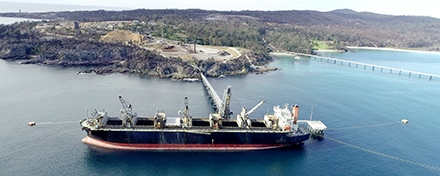Australia is bracing for a drawn-out disruption to its A$1.6 billion annual timber trade with China after requests to Beijing’s customs officials to resume the log exports were ignored, two sources told Reuters. Sources: Reuters, Timberbiz, Nasdaq
The four-million-tonne log timber trade with China has been largely suspended since late last year after Beijing said it had found pests in shipments coming from several Australian ports.
Woodchips, however, continue to be exported to China.
Australian timber is one of several commodities and products, including coal, barley, seafood and wine, subject to either trade bans or other restrictions by Beijing amid souring relations between the trade partners.
While Beijing’s curbs have roiled niche industries reliant on Chinese buyers, with shipments of rock lobsters and bottles of wine halted at customs, it has not targeted the more valuable iron ore and gas trade, which underpins a resurgent Australian economy.
Australia’s Department of Agriculture did not receive a response after providing evidence to China’s General Administration of Customs that the shipments were sprayed with pesticides, said the sources, who have direct knowledge of the approaches but declined to be named because of the sensitivity of the matter.
The cold shoulder from China suggests a potentially protracted period of strain for two-way trade, given the frosty relations between Canberra and Beijing is now ensnaring bureaucrats who would usually stay engaged during a temporary disagreement, they said.
“At least hundreds of workers nationally have already lost work as a result of forest thinning, harvesting and haulage, and port operations being deferred,” Victor Violante, deputy chief executive of the Australian Forest Products Association (AFPA), told Reuters.
“If the trade suspension continues for months or even years, it will severely impact the whole supply chain including sawmills, and with-it thousands more jobs.”
Diplomatic ties between Australia and its largest trading partner deteriorated last year after Canberra called for an international inquiry into the source of the coronavirus, angering China.
In a recent statement to Reuters, the Chinese foreign ministry said China applies normal precautionary biosecurity measures, such as inspection and quarantine, to overseas goods, and referred questions specific to the Australian timber case to the relevant authorities.
China typically takes more than 90% of Australian log exports, mainly consisting of cheaper “pulp” logs that most local mills aren’t set up to process. Australian mills generally process more valuable sawlogs, used in the local construction industry.
While the Australian economy is emerging strongly from the coronavirus pandemic, driven by robust mining, agriculture and housing industries, there are pockets of distress.
While some logs can be turned into woodchips and exported – a category of timber not subject to Chinese restrictions – most pulp logs are either piling up or being left in the ground.
“It’s virtually a ghost town in the log yards,” said Steve Garner, who chairs the business-focussed Committee for Portland, a town in Victoria state heavily reliant on its deep-water port which exports logs to China.
“There have been hundreds of jobs that have been put on hold.”
Australia exports logs to China worth just over A$600 million and woodchips worth almost A$980 million annually, according to 2018-19 trade figures.
Portland timber businesses told Reuters that India was the obvious market to replace China, although redirecting such large quantities would be a long-term process.
The forestry and logging industry directly employs around 3,400 workers, government data shows, while support services such as timber trucking businesses employ an additional 4,900.
David Quill, from the South Australian Timber Processors Association, said the issue was forcing Australia to seriously consider building up its own processing capacity.
“The positive effect, if there’s been any, is that there is now more material available for manufacturing industries in Australia,” said Quill.






